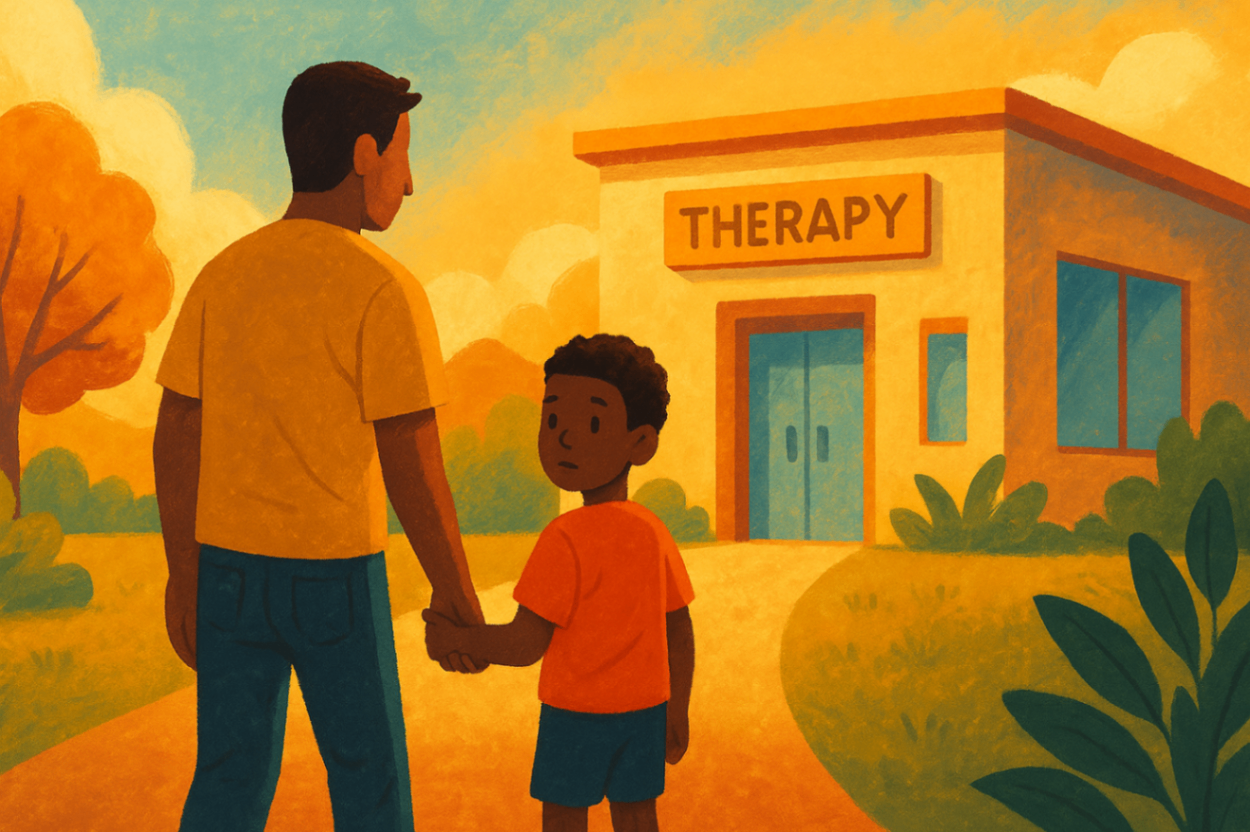
guide to accessing ndis support for autism in liverpool
12 July, 2025

Key Highlights
-
Discover how families in Liverpool, Casula, Lurnea, Moorebank, Prestons, Chipping Norton, and Warwick Farm can access NDIS autism support services to enhance daily living and independence.
-
Learn about the eligibility criteria, including autism diagnosis requirements and how to apply for funding through the National Disability Insurance Scheme.
-
Explore local advisory services and organisations that guide caregivers and autistic people in navigating NDIS processes.
-
Gain insights into choosing suitable NDIS providers to meet your child’s unique support needs.
-
Understand common challenges faced in handling NDIS funding and practical solutions to overcome them.
-
Follow a step-by-step guide for accessing autism-related supports under NDIS, tailored for Liverpool families.
Introduction
If you're a parent in Liverpool raising a child with autism, navigating the NDIS can feel overwhelming—but you're not alone. The NDIS for autism offers access to therapies, funding, and professional supports tailored to your child's developmental needs.
Whether you’re starting the application process or looking to maximise your current plan, understanding how to access NDIS autism support is the first step. This guide walks you through eligibility, diagnosis, available services, and how to choose the appropriate support, including the right autism support worker or autism advisory service to help you create a meaningful plan for your child.
Helping Your Child Access NDIS Autism Support in Liverpool
 For families in Liverpool, getting the most from the National Disability Insurance Scheme (NDIS) begins with the right diagnosis and a personalised plan. Your Local Area Coordinator (LAC) will support you in identifying the services your child needs, setting clear goals, and coordinating planning meetings. Working closely with developmental paediatricians and other allied health professionals is critical—especially when preparing reports for the NDIS access request. Many families also engage early intervention services available through the Early Childhood Early Intervention (ECEI) pathway, which supports children under 9 years old.
For families in Liverpool, getting the most from the National Disability Insurance Scheme (NDIS) begins with the right diagnosis and a personalised plan. Your Local Area Coordinator (LAC) will support you in identifying the services your child needs, setting clear goals, and coordinating planning meetings. Working closely with developmental paediatricians and other allied health professionals is critical—especially when preparing reports for the NDIS access request. Many families also engage early intervention services available through the Early Childhood Early Intervention (ECEI) pathway, which supports children under 9 years old.
With the right help, your child can access therapies that build communication skills, independence, and quality of life.
Who Is Eligible for NDIS Autism Support?
To qualify for NDIS support for autism, your child must:
-
Have a formal diagnosis of Autism Spectrum Disorder (ASD) using the DSM-5
-
Show significant functional limitations in communication, social interaction, or daily living
-
Be under 65 when applying
-
Meet Australian residency requirements (citizen, permanent resident, or Protected SCV)
Autism diagnoses that fall under Level 2 or Level 3 are often automatically considered eligible. For Level 1 or borderline cases, supporting evidence from therapists is crucial to show how the condition affects your child’s ability to function independently.
Eligibility criteria for people with Autism Spectrum Disorder (ASD)
Eligibility for the NDIS depends on a few main things for people with autism spectrum disorder (ASD). First, to be on the NDIS, you need to have a clear diagnosis of autism spectrum disorder from a health professional that uses the DSM guide. The person must meet the NDIS eligibility requirements by having a permanent disability. This disability should mean they need substantial support with daily life. Some of these needs could be help with social communication or capacity building. It is important to meet the residency requirements in Australia, too. People get NDIS funding only when what they ask for fits into the goals of their NDIS plan. This plan should be made just for their support needs, so they get the help that works best for them.
Autism diagnosis requirements for NDIS access
To access NDIS autism support services, a comprehensive diagnostic report is required. This report is typically completed by a:
-
Developmental paediatrician
-
Psychologist or psychiatrist
-
Multidisciplinary assessment team
The report should detail your child’s developmental history, current functional challenges, and how autism affects their ability to learn, socialise, and manage daily life. It must align with the Diagnostic and Statistical Manual of Mental Disorders (DSM-5) criteria and clearly explain why ongoing, funded support is needed.
💡 Tip: Ask your GP for referrals and request that reports highlight the functional impacts—not just diagnostic labels.
Local Help: Who Can Support You Through the Process?
Getting autism support through NDIS can be easier if you use help from local resources. In Liverpool, families can reach out to local area coordinators (LACs) or plan managers who know a lot about these programs. LACs talk with you about your support needs and help set goals, so the right support services are in your plan.
Plan managers take care of the money and paperwork. This lets you use your time on your child's growth and daily life instead. Liverpool support services aim to make difficult things simple. With their help, NDIS autism support is there to be used by you, so everyone has what they need. Before exploring local access steps, get a solid foundation by reading Understanding NDIS for Autism.
What types of support does the NDIS offer for individuals with autism?
The NDIS provides a range of support services for individuals with autism, including therapy sessions, assistive technology, and personal care assistance. Additionally, funding for community participation and skill development programs is available to enhance independence and quality of life for those on the autism spectrum. To confirm your eligibility and funding options in detail, check out NDIS Funding for Autism & Eligibility.
Autism Advisory and Support Services in Liverpool
An autism support worker provides day-to-day help with:
-
Communication and social development
-
Community participation
-
Behavioural regulation and skill-building
-
Routine development at home or school
Support workers are often key to delivering therapies in real-life environments, and their services can be funded under both Core and Capacity Building budgets.
Choosing the Right NDIS Providers
Finding the right service providers helps your child use the NDIS plan funds in the best way. This makes sure your child’s needs are met fast and well. In Liverpool, families can use the NDIS provider finder on the NDIS website to look at and compare different services. It is good to pick providers who have worked with autism, as they know how to give good care.
|
Provider Selection Criteria |
Provider Evaluation Guidelines |
|---|---|
|
Expertise in autism supports |
Reviews and testimonials from other families |
|
Alignment with NDIS plan goals |
Accreditation or approval from NDIA |
|
Flexibility in services |
Accessibility for Liverpool-area families |
Picking service providers that help with your child’s developmental steps will improve the quality of life for autistic individuals. It helps to look at trusted places for behavioural therapy, speech therapy, and occupational therapy. This will help you use your NDIS plan funds well. It is common to face some trouble during this time, but knowing what might happen will help you get ready.
Common Challenges When Accessing NDIS Support for Autism
 Families often run into problems when they fill out access request forms for NDIS autism funding. They may find it hard to collect proof to show the need for necessary supports. Delays during the process, or not knowing enough about mental health or autism needs, can also make it tougher for them.
Families often run into problems when they fill out access request forms for NDIS autism funding. They may find it hard to collect proof to show the need for necessary supports. Delays during the process, or not knowing enough about mental health or autism needs, can also make it tougher for them.
To deal with these problems, it helps to work with health professionals. This way, you get full reports on how daily life or development is affected. Using advisory services like LACs can make the NDIS process easier, as they give help made for your needs. If you get your documents ready before you start and ask for support when wanted, you give yourself a better chance to get the support you need.
Step-by-Step Process to Access NDIS Autism Support
Start by getting an official autism diagnosis from health professionals, including an ASD diagnosis. After that, fill out an access request. You can do this on the NDIS website or at your local NDIA office. Make sure you include proof that shows your child’s ASD level and the way it affects daily life.
When you get approved, you will go to a planning meeting. Here, you will talk about autism NDIS plans. This is a good time to set goals, like better communication or helping your child with developmental delay be more independent. Early intervention, through the Early Childhood Early Intervention (ECEI) pathway, is made for kids under nine. It helps families get the right services fast. Referrals and local resources can also help and make the steps easier. Liverpool families have good support at every stage.When you’re ready to draft a support plan that reflects your child’s needs, head to the NDIS Autism Support Plan Guide.
Why Liverpool Families Choose daar for NDIS Autism Support
At daar, we specialise in providing compassionate, evidence-based support for autistic children and their families. Our Liverpool clinic proudly supports families across Casula, Lurnea, Moorebank, Prestons, Chipping Norton, and Warwick Farm. We offer:
-
NDIS-approved therapies across speech, behaviour, and occupational support
-
Dedicated autism support workers and therapists who know how to engage your child
-
Flexible services—at home, in school, in clinic, or online
-
Guidance through every stage of your NDIS journey—from diagnosis to plan reviews
We collaborate with families to ensure your child receives the right care, at the right time, in the right setting—no matter where you live in the Liverpool area.
Book your consultation now to explore tailored NDIS autism support services in Liverpool.
Conclusion
Accessing NDIS support for autism in Liverpool doesn’t have to be difficult—especially when you have the right guidance and resources in place. By understanding the eligibility process, preparing the right documentation, and connecting with local advisory and provider services, you can unlock life-changing supports for your child.
Frequently Asked Questions
How do I find NDIS autism support near me?
To find NDIS support services for autism in your area, use the NDIS provider finder on their website. If you are in Liverpool, you can get in touch with local service providers who focus on autism support. Websites like Clickability can help you see different support services and compare what other people say in their reviews. This can help you make a good choice for autism support and NDIS help.
What’s included under NDIS support for autism?
NDIS helps people with autism by giving money for necessary supports, including core funding. This help can cover speech therapy, working with an occupational therapist, help with behaviour, and programs to help with social skills. There is support for core things and for capacity building. These focus on making daily life better and help people with autism spectrum disorder to be more independent. The funding is there to help people work on their skills and grow in their daily life. With this support, people on the autism spectrum can get the chance to live well and do more on their own through the NDIS.
What does an autism support worker do?
An autism support worker helps autistic people with many parts of their daily life. They support the person in social communication and look after their mental health. At the same time, they help people be more independent. They also connect people to those in their community when needed. These autism support workers are important because they can help people do better and learn ways to handle problems that may come up.
Can I self-manage my autism support funding?
NDIS participants have the option to self-manage their autism support funding. This gives them maximum flexibility. With this way, families can pick providers they like, even if those are not registered. Another way is to have plan managers help. These plan managers can take care of the money side of things. They offer a structured plan management system that helps balance out the services for autism support in the NDIS.
.svg)

















